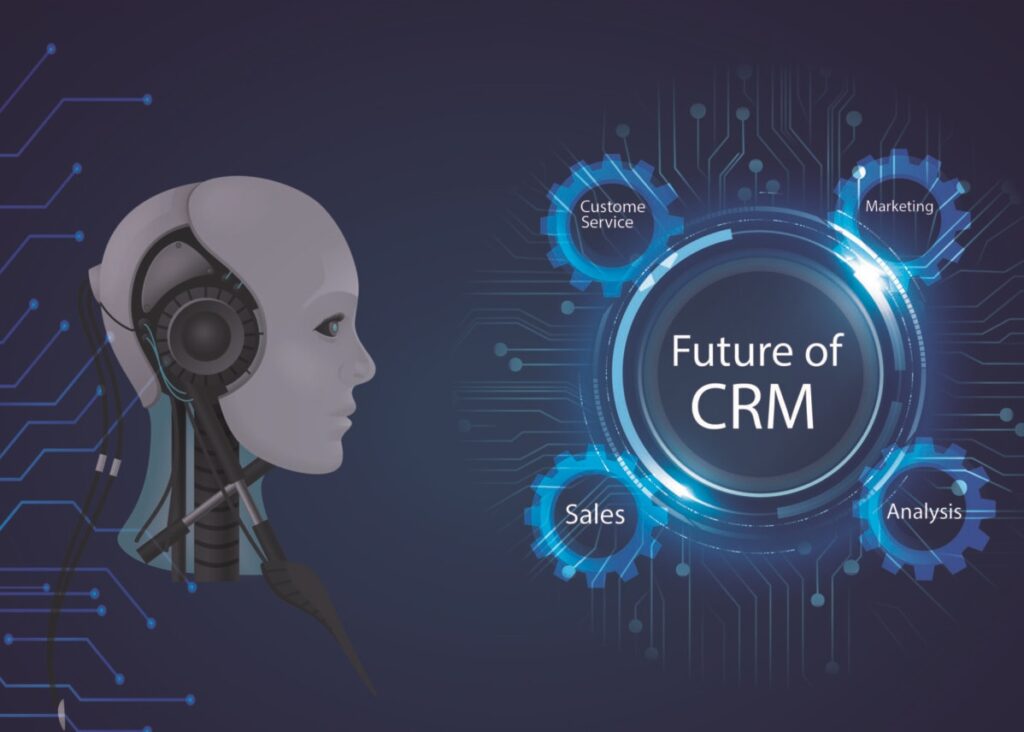Customer Relationship Management (CRM) has long been a cornerstone for businesses aiming to enhance customer engagement and streamline interactions. As we look to the future, CRM systems are poised to undergo transformative changes, driven by advancements in technology and an increasing focus on personalized customer experiences. Here’s a glimpse into what the future holds for CRM.

1. Artificial Intelligence and Machine Learning
Artificial Intelligence (AI) and Machine Learning (ML) are set to revolutionize CRM systems. These technologies can analyze vast amounts of data to predict customer behaviors, preferences, and needs. AI-powered chatbots and virtual assistants will become more sophisticated, handling more complex customer queries and providing instant support. Machine learning algorithms will enable CRMs to offer personalized product recommendations and targeted marketing campaigns, significantly improving customer satisfaction and retention.
2. Integration with IoT
The Internet of Things (IoT) is expanding rapidly, connecting a multitude of devices to the internet. Future CRM systems will integrate with IoT devices, allowing businesses to collect real-time data on customer behavior and product usage. This data will provide valuable insights into how customers interact with products, enabling companies to offer timely and relevant support, anticipate maintenance needs, and develop new features that cater to user preferences.
3. Enhanced Data Privacy and Security
With the increasing reliance on digital systems, data privacy and security have become paramount. Future CRM systems will incorporate advanced encryption methods and comply with stringent data protection regulations to safeguard customer information. Blockchain technology could play a crucial role in ensuring data integrity and security, providing a transparent and tamper-proof method for managing customer data.
4. Advanced Analytics and Predictive Insights
Future CRM platforms will leverage advanced analytics to offer deeper insights into customer data. Predictive analytics will help businesses forecast trends and customer behaviors, enabling proactive strategies. Real-time analytics will provide immediate feedback on marketing campaigns and customer interactions, allowing for agile adjustments and more effective decision-making.
5. Personalization at Scale
Personalization will continue to be a key focus in CRM development. Future systems will use AI to analyze customer data and deliver highly personalized experiences at scale. This could include customized content, tailored product recommendations, and individualized marketing messages. Enhanced personalization will lead to more meaningful customer relationships and higher conversion rates.
6. Unified Customer View
The future of CRM lies in creating a unified customer view, consolidating data from various touchpoints into a single, comprehensive profile. This holistic approach will enable businesses to understand their customers better and provide seamless experiences across all channels. Integration with other business systems, such as ERP and marketing automation platforms, will ensure that customer data is consistent and up-to-date.
7. Voice and Conversational Interfaces
Voice recognition technology and conversational interfaces will become more prevalent in CRM systems. As voice assistants like Amazon Alexa and Google Assistant become more integrated into daily life, CRM systems will need to support voice interactions. This shift will make it easier for customers to engage with businesses, enhancing convenience and accessibility.
8. Mobile and Remote Access
As remote work becomes more common, future CRM systems will prioritize mobile and remote access. Cloud-based CRM solutions will ensure that sales and support teams can access customer data from anywhere, at any time. Mobile-friendly interfaces and apps will facilitate on-the-go management of customer relationships, improving productivity and responsiveness.
9. Augmented and Virtual Reality
Augmented Reality (AR) and Virtual Reality (VR) technologies are set to enhance CRM systems by providing immersive customer experiences. For instance, AR could be used to offer virtual product demonstrations, while VR could create realistic simulations for training customer service representatives. These technologies will help businesses engage with customers in innovative and impactful ways.
10. Sustainability and Ethical Practices
Future CRM systems will also focus on sustainability and ethical practices. Customers are increasingly aware of environmental and social issues, and businesses will need to reflect these values in their CRM strategies. This could involve transparent reporting on sustainability initiatives, ethical data handling practices, and socially responsible marketing campaigns.
The future of CRM is exciting and full of potential. With advancements in AI, IoT, data analytics, and immersive technologies, CRM systems will become more intelligent, personalized, and secure. Businesses that embrace these changes will be better positioned to understand their customers, foster loyalty, and drive growth in an increasingly competitive market. As we move forward, the integration of ethical practices and sustainability will also play a crucial role, ensuring that CRM strategies align with the values of modern consumers.